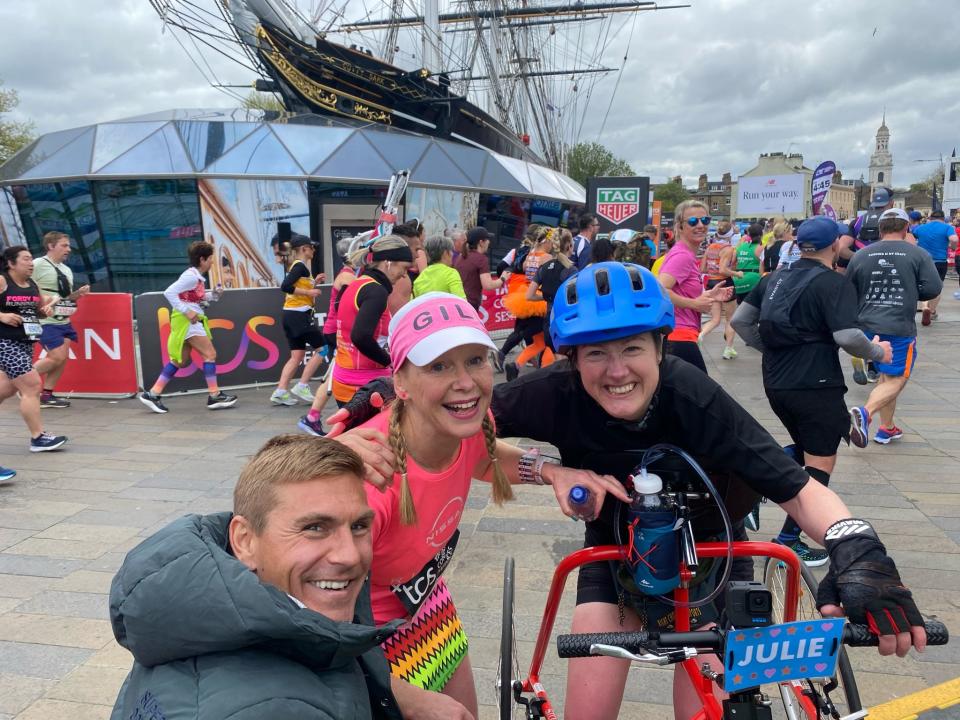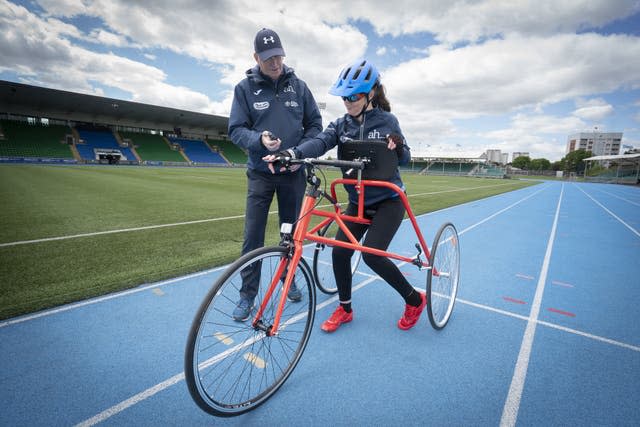Woman with cerebral palsy makes history at London Marathon
A woman with cerebral palsy who became the first female frame runner to complete the London Marathon said crossing the finish line was “surreal”.
Dr Julie McElroy, 38, from Glasgow, completed the marathon in five hours and 59 minutes on Sunday, accompanied by her support runner Gill Menzies, who said it was a “huge privilege” and a “massive challenge”.
Dr McElroy was introduced to frame running around three years ago after suffering a traumatic injury and since then has taken on numerous challenges, including the Paisley 10K and the 22.6 mile Glasgow Kiltwalk.

A frame runner is a three-wheeled frame where the athlete is supported by a saddle and body plate and uses their feet to pedal.
“It was a surreal experience and I feel like I’ve been in a dream for the last few weeks training for it,” Dr McElroy told the PA news agency.
“I was on the saddle for nearly six hours (on Sunday) and it was probably the longest time I’ve spent on my frame.
“The day came and I was relaxed, I wasn’t nervous, I was quite composed going into it.
“I knew I had the mental capacity, but it was the physical because you never know how your body is going to react.”
She added that she was “quite worried” she wouldn’t cross the finish line “because 26.2 miles is quite a long distance”.

“I’m just glad I did it in five hours and 59 minutes, I’m quite pleased with that time,” she said.
Dr McElroy said that the toughest part of the marathon was around the 16 mile mark, just over the halfway point.
“The hardest part was when I got to 16 mile mark, some people told me that’s the hardest part, because it did get quite tiring,” she said.
“That’s where I struggled most so my support runner Gill topped me up with more energy, like sweeties and jelly babies, to keep me going.”
She added that it was also a challenge to navigate between the runners on the route with her frame.
“My frame goes quite fast so I was worried about tripping people up,” she said.

“I had my support runner Gill there to help me to move other runners out the way because then I had space to run.”
Dr McElroy hopes her challenge will inspire others with disabilities to take up frame running.
“I hope people will get out there and get involved in sports – try frame running, it’s a fantastic sport and I’ve seen the benefits it’s had on me over the last few years.
“Six years ago, I had a serious traumatic injury and I never thought I would be running the London Marathon.”
Dr McElroy’s support runner, Gill Menzies, 51, said she was “so delighted” for her after she crossed the finish line.
“She was pretty exhausted for the second half and it was a case of using every mental tactic because I was desperate for her to finish in under six hours, and we made it with 29 seconds grace,” Ms Menzies, from Edinburgh, told PA.
“Her frame is wider than a normal runner so the risk of her running over people or people tripping into the frame is quite real.
“I ran a metre or so in front of her turning my head every few seconds to check if she was okay.
“It was a huge privilege and a massive challenge all at the same time.”
She added: “I really hope Julie running the London Marathon raises the profile of frame running for disabled runners and what’s actually possible.”
Dr McElroy has been raising funds for the Richard Whitehead Foundation, which was founded by British athlete Richard Whitehead MBE who runs with prosthetic legs.
To find out more, visit: justgiving.com/page/julie-mcelroy-1708542484607

 Yahoo Sport
Yahoo Sport 





































